Teacher pay scales 2024-25: what will your salary look like?

Following the Department for Education’s announcement that all teachers will receive a 5.5 per cent pay rise from September, the teacher pay scales have been updated.
From September 2024, the starting salary for teachers in England entering the profession will be a minimum of £31,650. For those teaching in London, this could be as much as £38,766.
What are the teacher pay scales?
Teacher pay scales are a series of salary bands used to ensure that teaching staff are paid an appropriate wage depending on their responsibilities and their experience.
Teachers working in England can find a full list of this year’s pay scales below:
- Main and upper pay scales (England, excluding London)
- Main and upper pay scales (London)
- Leadership pay scale
- Headteachers pay scale
- Additional payments
For those teaching in Scotland, take a look at the Scottish teacher pay scales 2024-25.
Main and upper pay scales (England, excluding London)
Teachers on the main and upper pay scale in England (excluding the London area) will earn a salary of between £31,650 and £49,084.
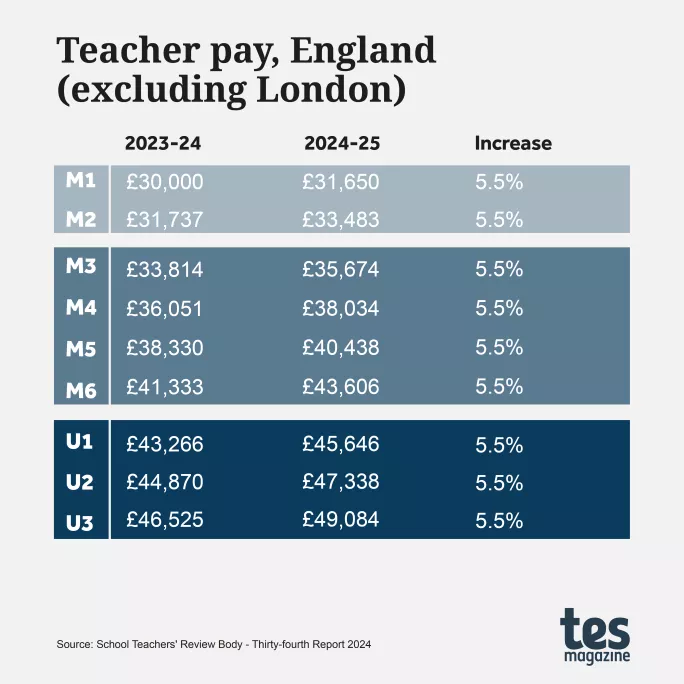
Main and upper pay scales for teachers in London
Main and upper pay scale teachers working in the London area will earn a salary between £33,074 and £60,092.
This breaks down according to region as follows.
Main and upper pay scales (inner London)
Teachers working in inner London will earn a salary between £38,766 and £60,092.
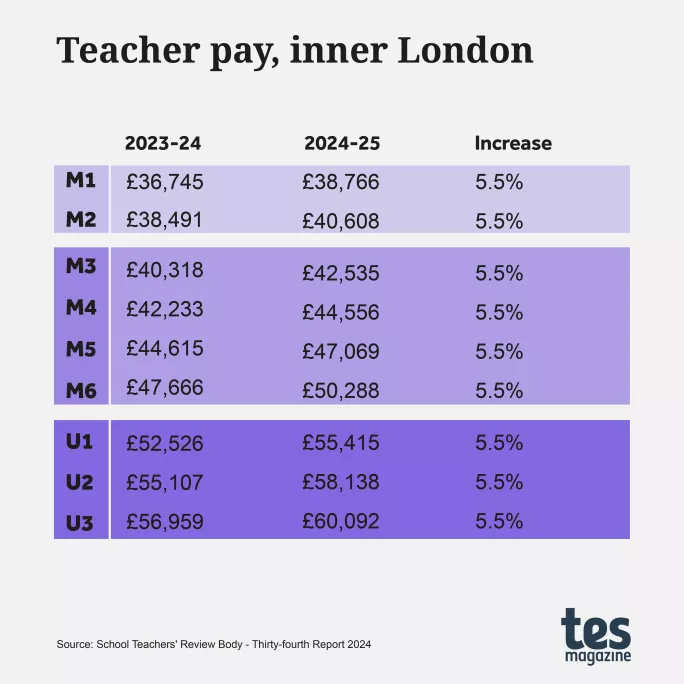
Main and upper pay scales (outer London)
Teachers working in outer London will earn a salary between £36,412 and £53,994.
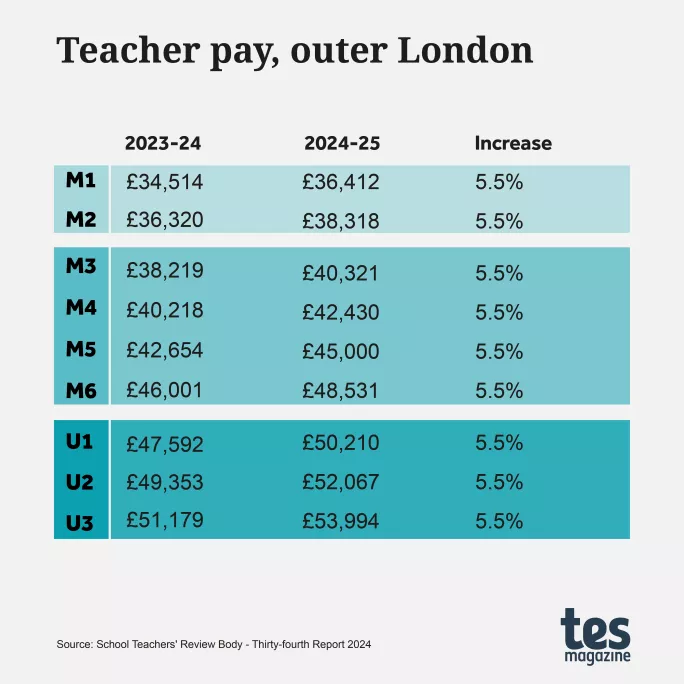
Main and upper pay scales (London fringe)
Teachers working on the London fringe will earn a salary between £33,074 and £50,470.
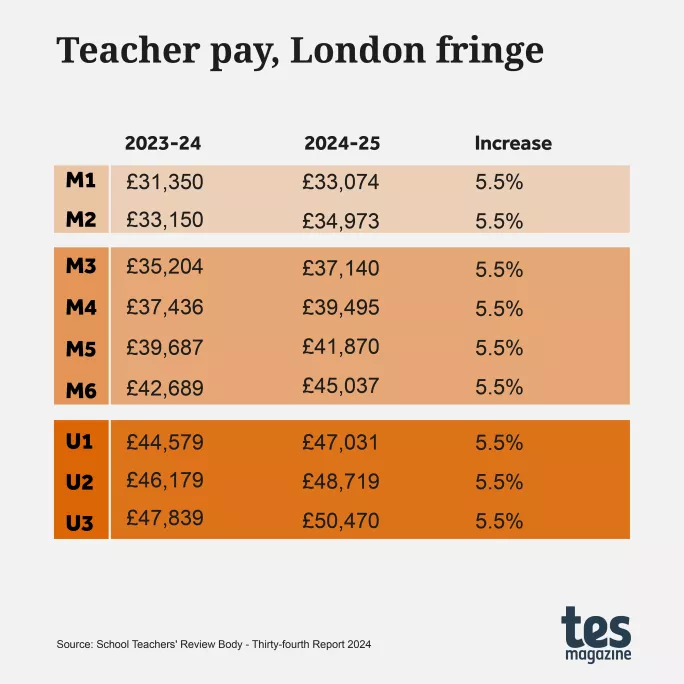
Leadership pay scale
School leaders in England can expect to be paid between £47,185 and £139,891.
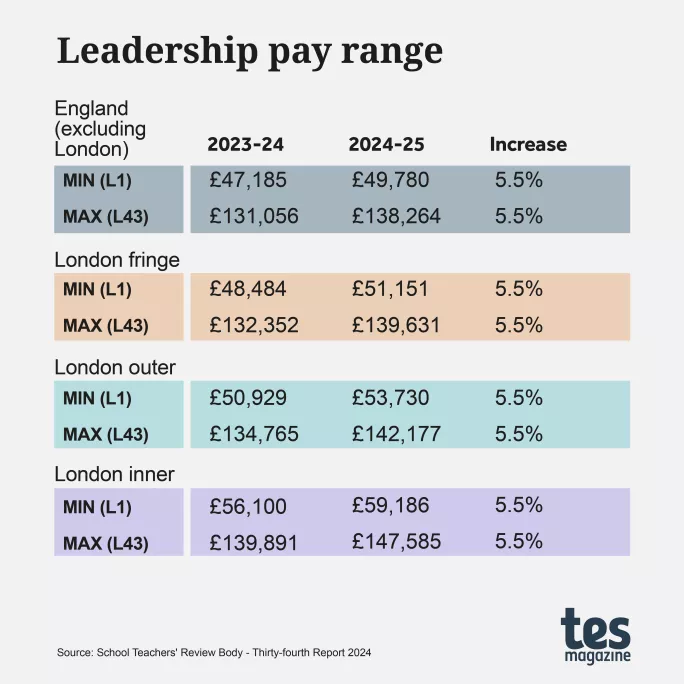
Headteacher pay scales
Headteachers in England can expect to be paid between £56,316 and £147,585. This breaks down according to region as follows.
Pay scale for headteachers in England (excluding London)
Headteachers working in England (excluding London) will earn a salary between £56,316 and £138,264.
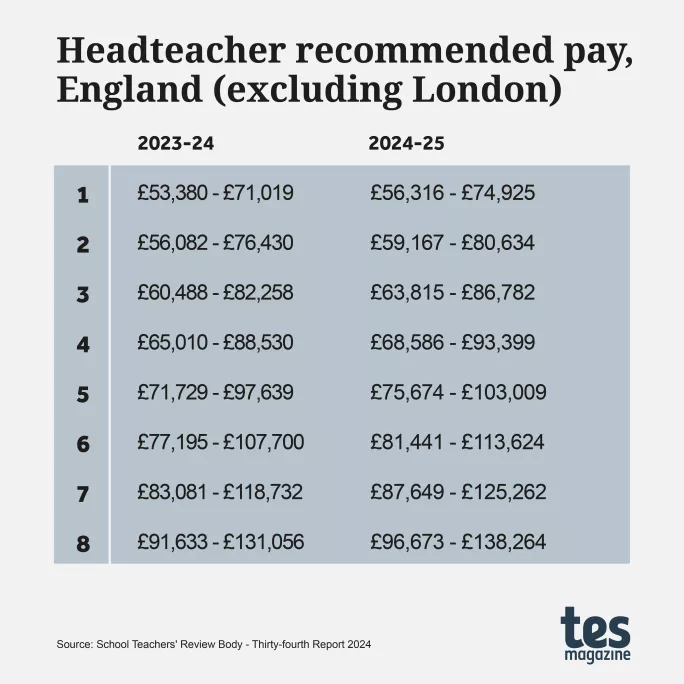
Headteacher pay scale (inner London)
Headteachers working in inner London will earn a salary between £65,730 and £147,585.
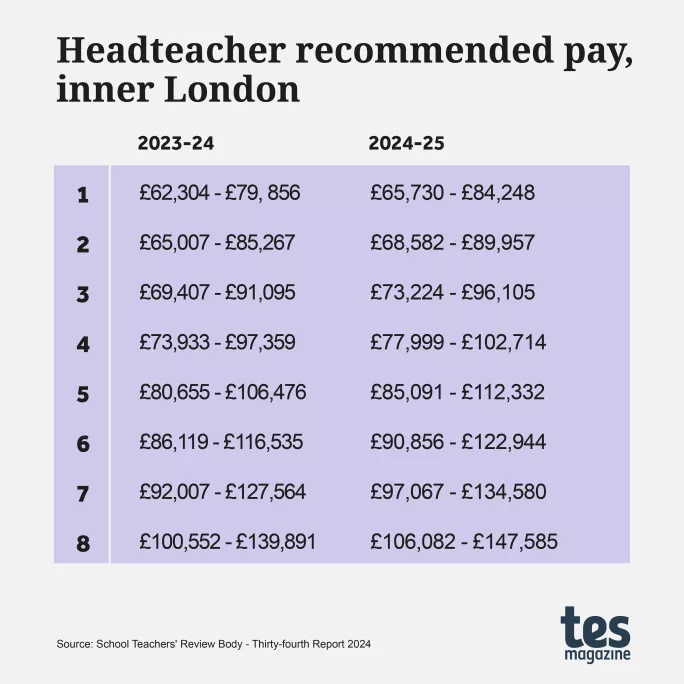
Headteacher pay scale (outer London)
Headteachers working in outer London will earn a salary between £60,266 and £142,177.
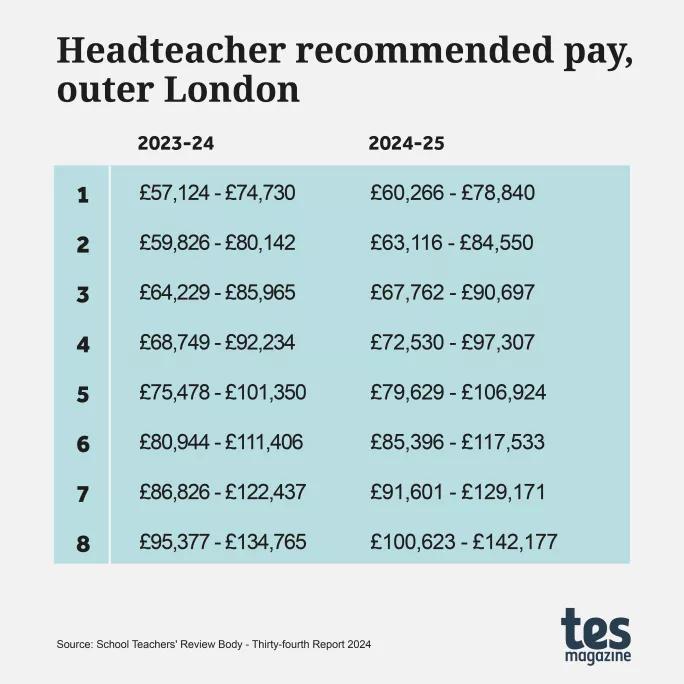
Headteacher pay scale (London fringe)
Headteachers working on the London fringe will earn a salary between £57,693 and £139,631.
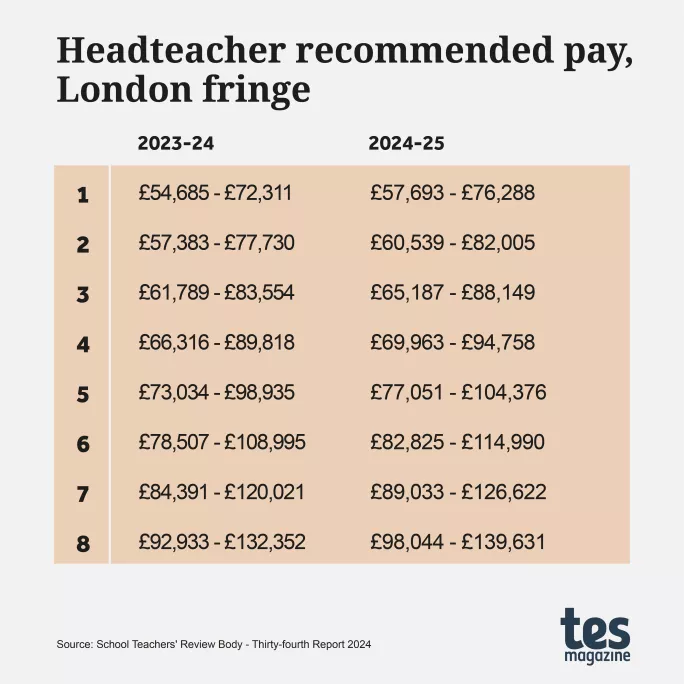
Which schools use the teacher pay scales?
According to the School Teachers’ Pay and Conditions (STPC) guidance, “schools and local authorities (LAs) must abide by” the pay scales.
It adds that “any party not following this guidance would need to have good reason not to do so and would need to be able to justify any departure from it”.
However, non-maintained schools (meaning academies, independent schools, public schools and private schools) are free to set their own pay scales.

What do unqualified teachers get paid?
Unqualified teachers (teachers who have not been awarded qualified teacher status, or QTS) are paid according to a different pay scale.
The unqualified teacher pay scale for 2024-25 ranges from £21,731 to £39,417. How much you are paid depends upon where in England you are working, and how many years of classroom experience you have. According to geographical area, this breaks down as follows.
Unqualified teacher pay scales for those teaching in England (excluding London)
Unqualified teachers working in England (excluding London) will earn between £21,731 and £33,901.
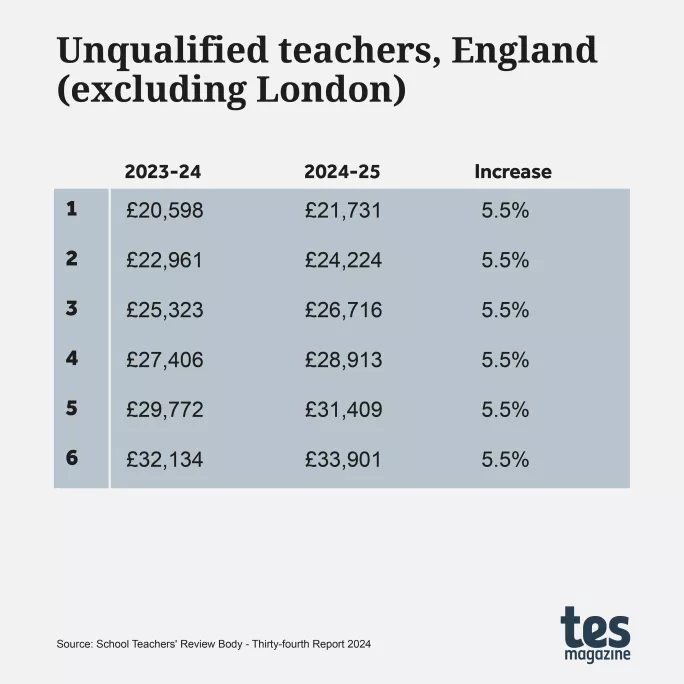
Unqualified teacher pay scale (inner London)
Unqualified teachers working in inner London will earn between £27,252 and £39,417.
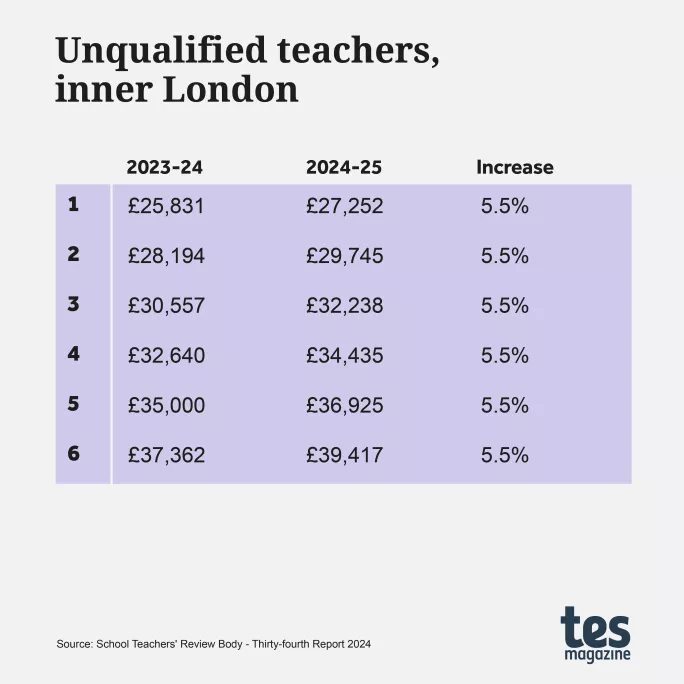
Unqualified teacher pay scale (outer London)
Unqualified teachers working in outer London will earn between £25,758 and £37,931.
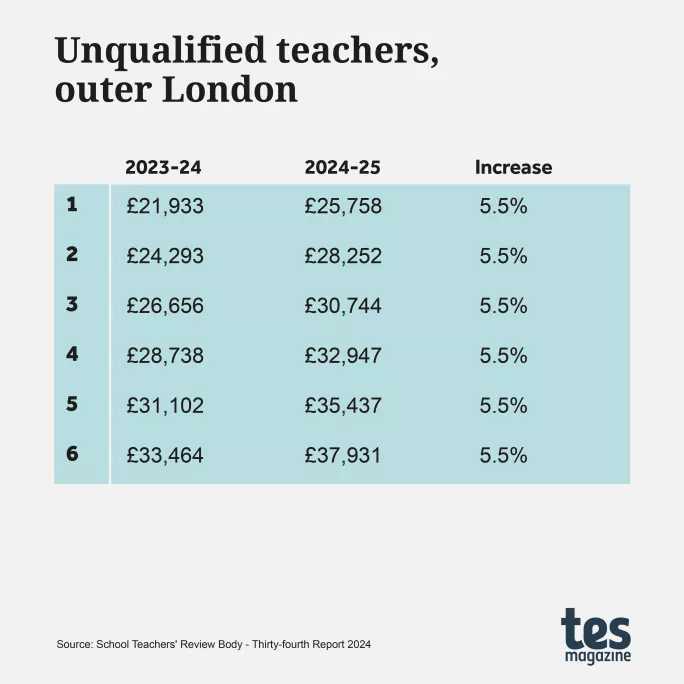
Unqualified teacher pay scale (London fringe)
Unqualified teachers working on the London fringe will earn between £23,139 and £35,305.
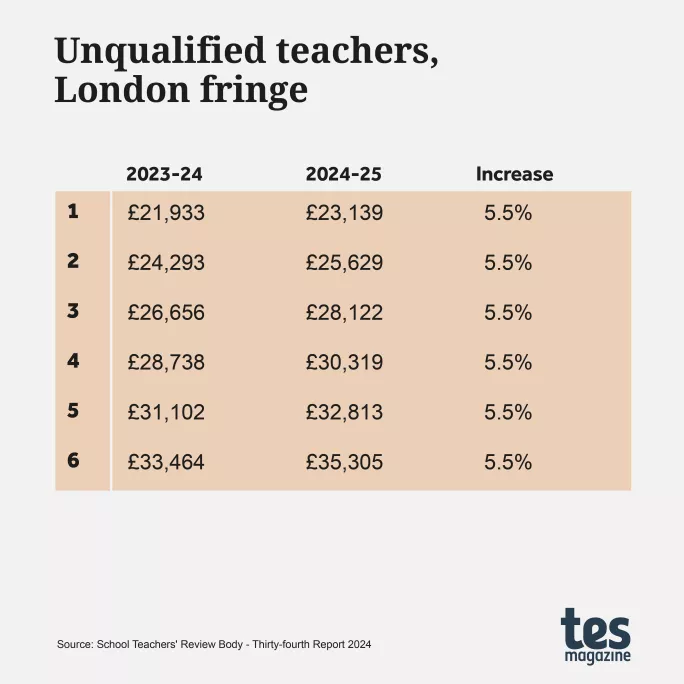
What additional payments do teachers receive?
Teaching and learning responsibility (TLR) payments
Teaching and Learning Responsibility (TLR) payments are awarded to teachers who take on additional responsibility. These payments are fixed for the whole of England and there is no London weighting.
These are also increasing next academic year, and teachers can expect to be paid:
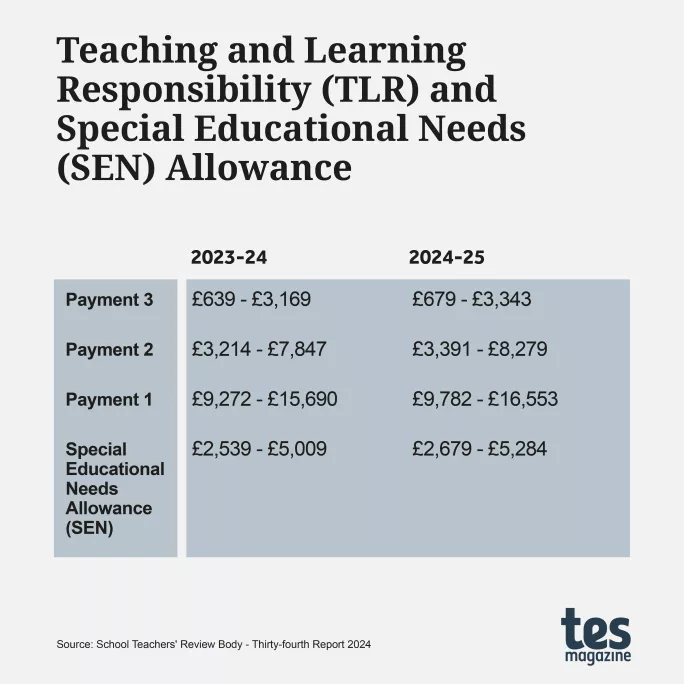
Find out more about teaching and learning responsibility payments.
Teacher retention payments
If you are in the first five years of your career and you teach a shortage subject, you may be entitled to teacher retention payments totaling up to £12,000.
Payments will be available to those working in disadvantaged schools, with the highest payments being made to those in an Education Investment Area (EIA).
Find out more about teacher retention payments.
Will teachers get a pay rise in 2025-26?
The Department for Education has recommended a 2.8 per cent pay award for teachers for 2025-26. This is yet to be confirmed.
How much will I contribute to my pension?
If you teach in a state school in England, you will be automatically enrolled into the Teachers’ Pension Scheme. The amount you contribute depends on your salary and can range from 7.4 to 11.7 per cent of your total earnings.
Find out more in our complete guide to teacher pensions.
Will I get maternity pay if I have a baby?
All teachers working in UK schools, provided they meet the qualfiying criteria, are entitled to maternity pay. The exact amount you receive will depend on a number of factors.
Find out more about teachers maternity pay and leave
How do teachers get a pay rise?
Generally speaking, teachers move up the main pay scale every year that they are in the classroom, and then reach the upper pay scale, where they are required to produce a portfolio of evidence to demonstrate their contribution to the school.
Once teachers reach U3 on the pay scale, their pay will stop increasing unless they take on extra responsibility with TLR or leadership pay attached.
However, each school will have its own appraisal system. To find out how teachers progress up the pay scale in a school, check your staff handbook or ask your line manager.
What if I decide to change job?
You may decide that the quickest way to move up the pay scale is to find a new job. In this case, you’ll need to consult the teacher resignation dates to see exactly when you need to hand in your notice.
Teachers have longer notice periods than a lot of other professions to prevent staff leaving part-way through a term, so it’s worth considering your resignation deadline before you look elsewhere.
Do teachers get paid on strike days?
Teachers involved in strike days will not be paid for the day in question. One day’s pay, calculated on the basis of 1/365th of their annual salary, will be deducted from their annual salary.
Find out more about how strike action affects teacher pay in our complete guide to teacher strikes. And if you’re not already a member, take a look at our guide to the UK’s teaching unions.
topics in this article



